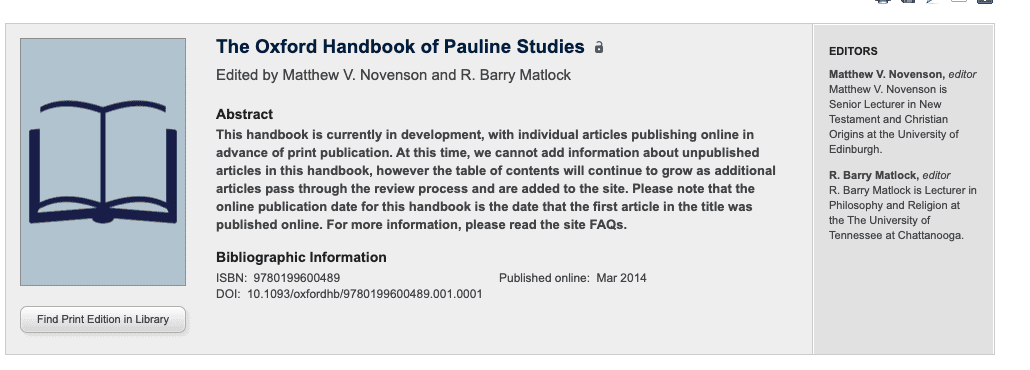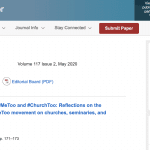I am deeply grateful for Matt Novenson’s invitation for me to write for the Oxford Handbook of Pauline Studies. I have been tracking the progress of this handbook for many years and Oxford has posted some chapters online (for subscribing institutions). The contributors are leading Pauline scholars, many working in the UK, but not all.
I wrote my essay on the Pistis Christou debate. I thought before that I had a good handle on the state of the discussion, but I went back and read all the relevant material going back 50-60 years and found fresh appreciation for the works of Sam K. Williams, Morna Hooker, and Shuji Ota (for example). The “real meaning” of this key phrase in Paul continues to be elusive, but I think scholarship is making progress and taking more seriously reception studies and the most relevant parallel language outside of Paul.
I am told the OHPS will be released in print in the not-so-distant future. I can’t wait. This will be a must-have volume, but for most a “must-loan-from-the-library” since these handbooks are pricey.
Here is the abstract to my essay:
An enduring discussion in Pauline studies is the so-called pistis Christou debate. This involves the half-dozen cases in the undisputed Pauline letters where this genitive phrase appears and it is unclear whether the phrase should be read ‘faith in Christ’ or ‘the faithfulness of Christ’. Over the past several decades, numerous books, articles, and essays have engaged vigorously on this issue; more than Greek syntax and proper translation appears to be at stake. This debate involves important questions related to Paul’s understanding of the means and manner of justification with God. How important is human faith and agency in Paul’s theology? To what degree does Paul present Christ not only as saving agent of God’s righteousness but also a model of faithfulness? What exactly does Paul mean when he refers to pistis?
Here is the list of chapters (though I think they are adding more):
- The Man and the Myth: Calvin J. Roetzel
- Paul the ‘Convert’?: Paula Fredriksen
- Paul the Missionary: Eckhard J. Schnabel
- Paul the Theologian: L. Ann Jervis
- Paul the Apostle: Loveday Alexander
- Archaeology and the Pauline Letters: Cavan Concannon
- Paul among Jews, Greeks, and Romans: Paul Trebilco
- Paul and the Construction of Early Christian Identity: Magnus Zetterholm
- Paul and Economic Resources: Bruce W. Longenecker
- Paul the Philosopher: Troels Engberg-Pedersen
- Paul and Religion: Emma Wasserman
- The Pauline Letters in Contemporary Research: A. Andrew Das
- The Deutero-Pauline Letters in Contemporary Research: Margaret Y. MacDonald
- Paul the Letter Writer: Laura Dingeldein
- Rhetoric and Argumentation in the Letters of Paul: Lauri Thurén
- The Text of the Pauline Corpus: Michael W. Holmes
- The Formation of the Pauline Corpus: Harry Y. Gamble
- Paul and Scripture: Francis Watson
- Paul and Jesus: Michael B. Thompson
- Christology: Richard Bauckham
- Justification by Faith: Simon Gathercole
- Participation in Christ: Susan Eastman
- Grace/Gift in Paul: John M. G. Barclay
- Paul and Pistis Christou: Nijay K. Gupta
- Ethos and Community: David G. Horrell
- Cosmology and Eschatology: T. J. Lang
- Social-Scientific Approaches to Paul: Todd D. Still
- Paul and Ethnicity: Caroline Johnson Hodge
- Paul and Politics: Davina C. Lopez and Todd Penner
- Paul and Postcolonial Studies: Joseph A. Marchal
- Paul and Feminism: Kathy Ehrensperger
- Paul and Theological Interpretation: Stephen E. Fowl
- Paul and Reception History: John Riches













